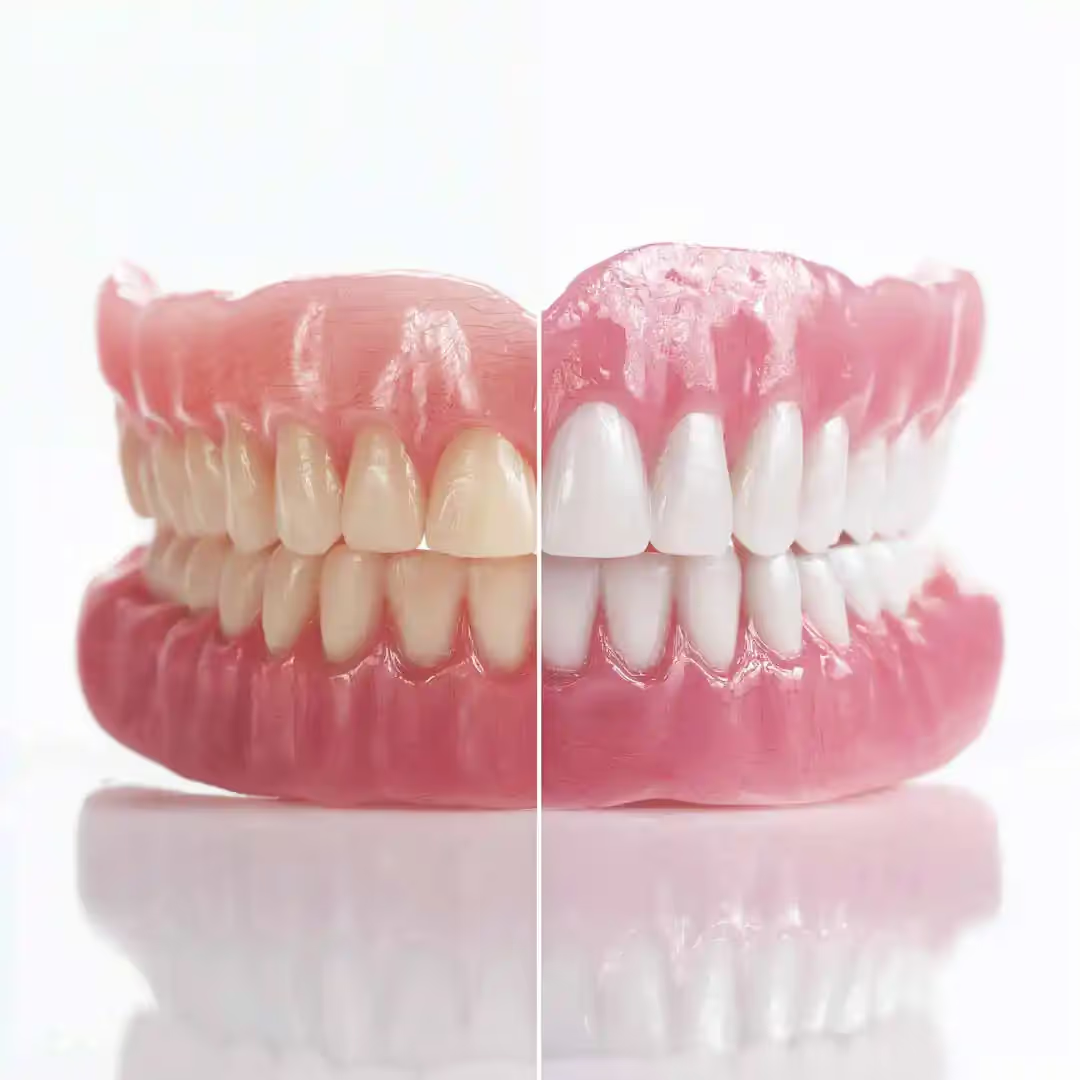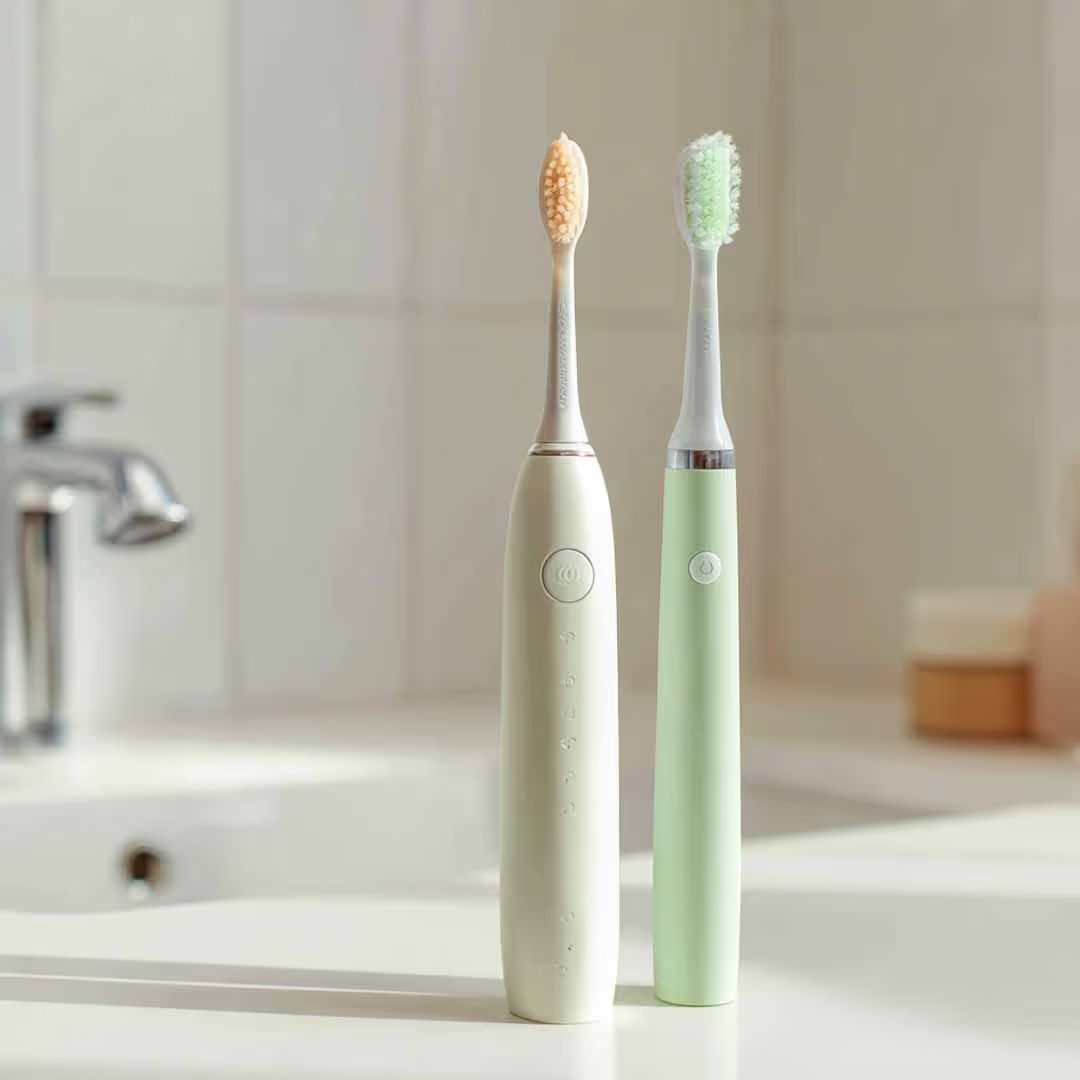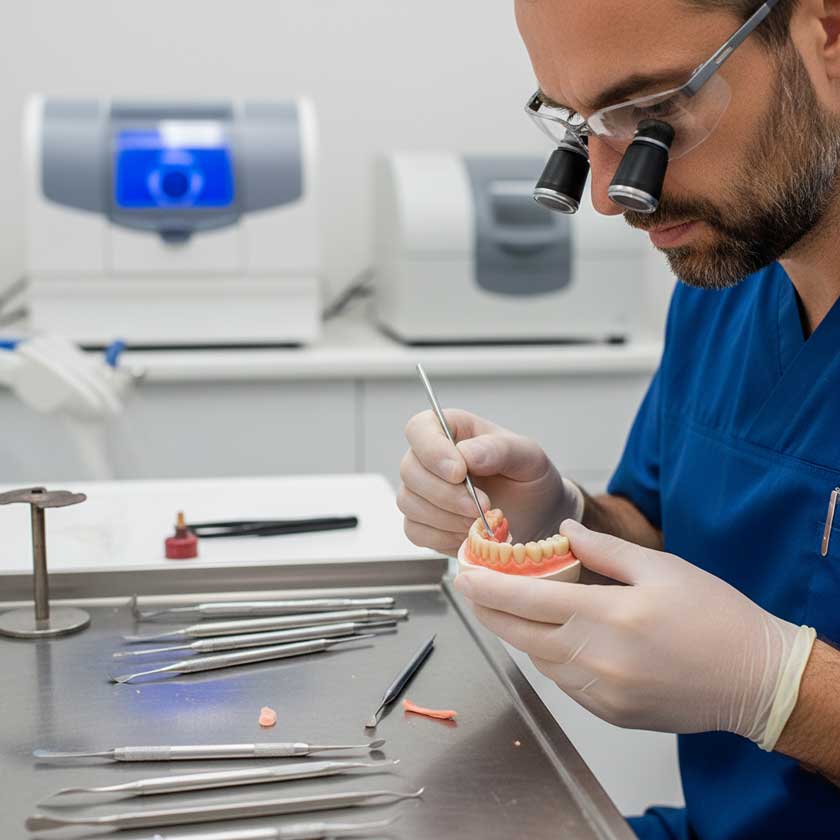As a denture specialist at New Smile Dentures, I'm often asked whether patients can use their electric toothbrushes on their new dentures. It's a great question, and one that deserves a thorough answer. After all, you've invested in your smile, and you want to maintain it properly.
The short answer: Proceed with caution.
While electric toothbrushes can technically be used on dentures, I generally recommend a gentler approach. Dentures are crafted from materials that are softer than natural tooth enamel, making them more susceptible to scratching and damage from the rapid vibrations and rotations of electric brushes.

Understanding the risks.
Why electric toothbrushes can be problematic.
Electric toothbrushes are engineering marvels designed specifically for natural teeth. They typically produce anywhere from 2,500 to 30,000 movements per minute – fantastic for removing plaque from tooth enamel, but potentially harmful to denture materials.
The main concerns I share with my patients include:
Surface Damage: Those powerful vibrations that work wonders on natural teeth can create microscopic scratches on denture surfaces. These scratches become breeding grounds for bacteria and can lead to staining and odor issues over time.
Pressure Control Issues: The rapid movement of electric toothbrushes makes it harder to control the pressure you're applying. Too much pressure can warp or damage the delicate acrylic or plastic components of your dentures.
Wear Patterns: Consistent use of electric toothbrushes on dentures can create uneven wear patterns, potentially affecting how your dentures fit and function.
When electric toothbrushes might work.
That said, I understand that many of my patients love their electric toothbrushes and want to continue using them. If you're determined to use one, here's my professional advice:
For partial denture wearers
If you have partial dentures, you're in a unique position. You need to care for both your natural teeth and your prosthetic. Here's what I recommend:
- Use your electric toothbrush on your natural teeth as normal – they benefit from that deep cleaning action
- When cleaning your partial denture, remove it first
- Turn OFF your electric toothbrush and use just the tip of the soft-bristled head to gently clean the denture
- This gives you the convenience of one tool while protecting your investment
Choosing the right electric toothbrush.
If you absolutely must use an electric toothbrush on your dentures, look for models with:
- Gentle or Sensitive Mode Settings: These reduce the intensity of vibrations
- Ultra-Soft Bristles: Never use medium or hard bristles on dentures
- Adjustable Power Settings: Start with the lowest setting and only increase if necessary
- Pressure Sensors: These alert you when you're brushing too hard
Some models that my patients have had success with include the Philips Sonicare Protective Clean series with gentle mode, the Oral-B Pro 1000 with sensitive settings, and the Quip Electric Toothbrush, which has notably gentle vibrations.
My professional recommendation: Denture-specific brushes.
After years of helping patients maintain their dentures at New Smile Dentures, I consistently recommend purpose-built denture brushes. Here's why:
The denture brush advantage.
Denture brushes are specifically engineered with your prosthetic in mind. They feature:
- Dual-Head Design: A larger head for broad surfaces and a smaller, angled head for those hard-to-reach areas
- Specialized Bristles: Softer than regular toothbrush bristles but firm enough to remove debris effectively
- Ergonomic Handles: Designed for better grip and control during cleaning
- No Risk of Mechanical Damage: Manual brushing gives you complete control over pressure and movement

The proper denture cleaning routine.
Whether you choose an electric or manual approach, here's the cleaning routine I recommend to all my patients:
Daily cleaning protocol
- Rinse After Eating: Simply rinse your dentures under running water after meals to remove loose food particles
- Nightly Deep Clean:
- Remove your dentures carefully over a sink filled with water or lined with a towel
- Use a soft-bristled denture brush with denture cleanser (never regular toothpaste!)
- Brush gently using circular motions
- Pay special attention to grooves and attachment areas
- Rinse thoroughly with cool or lukewarm water (never hot!)
- Overnight Soaking: Soak your dentures in a denture cleaning solution to eliminate bacteria and remove stubborn stains
Critical mistakes to avoid.
Throughout my practice, I've seen well-meaning patients damage their dentures through improper care. Please avoid:
- Using Regular Toothpaste: Most toothpastes contain abrasives that will scratch denture surfaces
- Hot Water: Can warp and distort denture shape
- Bleach or Harsh Chemicals: These can weaken denture materials and cause discoloration
- Vigorous Scrubbing: Gentle circular motions are all you need
Special considerations for different denture types.
Full dentures
Full dentures are particularly vulnerable to damage from electric toothbrushes. The large surface area means more potential for scratching, and the suction seal can be compromised if the surface becomes too rough. Stick with manual denture brushes for these.
Implant-supported dentures
If you have implant-supported dentures, you might wonder about the implant sites themselves. Good news: once fully healed, the implant posts can handle electric toothbrush cleaning. However, the denture attachment that clips onto these implants should still be cleaned gently, preferably with the toothbrush turned off.
Immediate dentures
Patients with immediate dentures need to be especially careful. During the healing period, use only the gentlest cleaning methods. An electric toothbrush is definitely not recommended during this phase.
Making the transition
If you're switching from natural teeth to dentures, I understand the desire to stick with familiar tools like your electric toothbrush. Change can be challenging, but think of it this way: your dentures are a significant investment in your quality of life. Using the right cleaning tools is a small adjustment that pays big dividends in the longevity and appearance of your prosthetic.
When to see your denture professional.
Regular check-ups at New Smile Dentures are crucial for maintaining optimal denture health. Schedule an appointment if you notice:
- Visible scratches or damage on denture surfaces
- Changes in fit or comfort
- Persistent odors despite regular cleaning
- Staining that won't come out with normal cleaning
- Any chips, cracks, or broken components
The bottom line
While the convenience of electric toothbrushes is undeniable, when it comes to denture care, sometimes the traditional approach is best. A quality denture brush, proper cleaning technique, and regular professional maintenance will keep your dentures looking and functioning their best for years to come.
At New Smile Dentures, we're committed to helping you maintain your investment and your confidence. If you have questions about denture care or need personalized advice for your specific situation, don't hesitate to reach out. We're here to ensure your new smile continues to serve you well.
Remember, proper denture care isn't just about maintaining your prosthetic – it's about maintaining your overall oral health and quality of life. Choose your cleaning tools wisely, be gentle with your dentures, and they'll reward you with years of comfortable, confident smiles.








